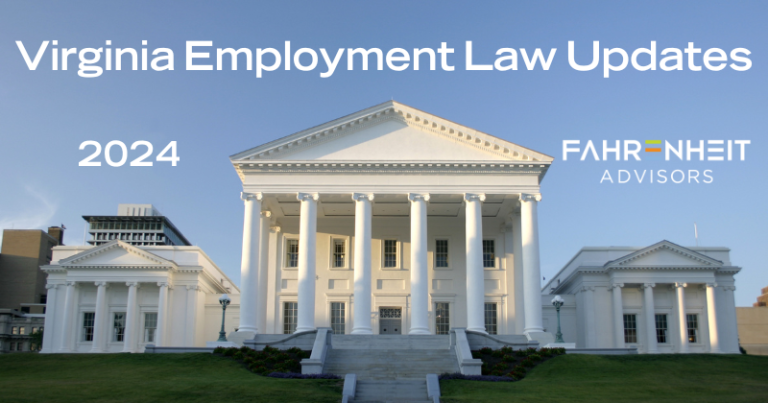Virginia Employment Law Updates for 2024

Fahrenheit’s Human Capital Consulting Practice has been tracking the legal updates for HR teams across the Commonwealth of Virginia going into effect on July 1, 2024.
Compliance serves as a shield against legal liabilities and penalties. By staying informed about upcoming laws, HR professionals can proactively identify areas of non-compliance within their organizations and take necessary steps to rectify them. This proactive approach minimizes the risk of costly litigation, disruptions to business operations, reputational damage, and regulatory fines.
In today’s dynamic regulatory landscape, HR professionals are constantly challenged to stay on top of evolving legal requirements. With the new Virginia employment laws and regulations on the horizon, Fahrenheit Advisors’ team of compliance experts compiled the need-to-know updates for you and your team for what to expect come July 1 in order to mitigate any potential risks.
PASSED LAWS
The following laws passed during the 2024 General Assembly Session and have been signed into law. They will become effective July 1, 2024 and may have an impact on your employment practices.
H.B. 18|S.B. 7: Virginia Human Rights Act update
- Employers should update their policies and Employee Handbooks to include “ethnic origin” among the list of protected categories in all of their Anti-Discrimination, Harassment, and Retaliation Policies, as well as their EEO policies or any other policies that reference these policies.
S.B. 391|H.B. 149: Expansion of 2021 law covering lawful use of medical cannabis oil (excludes law enforcement officers).
- Employers may not terminate, discipline, or otherwise discriminate against employees for lawful use of medical cannabis oil. Employees must demonstrate that they are complying with the laws of the Commonwealth of Virginia and produce a medical certification, issued by a licensed practitioner, certifying that use of the cannabis treats or alleviates symptoms of a medical condition. This law does not protect against substandard performance due to impairment or allow possession of cannabis during work hours or require that an employer violate federal law or risk loss of a federal contract or funding. There are also testing threshold limits for certain defined defense and security agency employees.
H.B. 100: Increased penalties for child labor violations.
- Civil penalties increase from $10,000 to $25,000 for each violation that results in the death or serious injury of child in the course of employment.
VETOED MEASURES
Governor Youngkin vetoed the following measures, but we may see them in future sessions, as they remain areas of interest for Human Resources professionals.
H.B. 1|S.B. 1 Minimum Wage Reform: Would have increased minimum wage in Virginia from $12/hour to $13.50 in 2025 and $15 in 2026. Additionally, would have ended an exemption for farmworkers that excuses them from state minimum-wage requirements.
- The increases that passed this year were part of that earlier legislation that required re-enactment in this legislative session, as a means to keep up with the pace of inflation. As other states and the federal government continue to wrestle with this issue, it will likely continue to come up again in future sessions. Employers should continue to prepare for this eventuality.
H.B. 370|H.B. 990: Pay Transparency – Would have required employers to include salary ranges in job postings and prohibited employers from asking job applicants to disclose prior salary history.
- Many states are adopting pay transparency laws (8 states in 2024, and at least 15 others actively considered them in their legislative sessions this year). We are likely to see this issue again, as the trend is to favor transparency laws, which build trust between employees and employers, help with recruitment efforts, and encourage pay equity. Moreover, Virginia law already prohibits retaliation against employees for asking about, discussing, or disclosing salary information with others.
- While employers may continue to ask about previous salaries to manage expectations or to use as an informational benchmark only, they should engage in conversations with potential employees about salary expectations and set salaries using market data, internal and external comparators, and other job-related information. Basing salary decisions on prior salary information is risky – they may be adopting someone else’s discriminatory pay practices. Employers should also be aware that posting any salary range in the job advertisement will allow candidates to self-select themselves out of consideration, saving time for everyone.
S.B. 373: Paid Family Leave – Would have guaranteed workers paid family and medical leave, funded through new payroll tax.
- Virginia would have been the 14th state to adopt such a measure. The public sector would have been exempt. Per the Governor, the Bill would have removed all incentive for the private sector to provide these benefits and it would have been unfair to the public sector and nonprofits.
H.B. 938|S.B. 542: Certain employees who are out of work during labor disputes would have qualified for unemployment benefits.
- This move may have resulted in an increase in the payroll tax and involved the VEC in labor disputes. Given the increase in union activity in Virginia and the likelihood that this trend will continue, this issue may return in future sessions, or likely come us as an issue that may be negotiated during collective bargaining.
H.B. 770: Whistleblower Protection Reforms would have (1) extended the statute of limitations; (2) awarded double damages for willful violations; and (3) expanded the right to a jury to determine remedies, including reinstatement following retaliation.
- The Governor did not believe that juries should be determining remedies.
S.B. 259|H.B. 418: Class Action suits would have been allowed to be filed in state courts.
- Only two states do not allow class action suits in state courts (Virginia and Mississippi). While the Governor cited an inevitable increase in court activity, it is likely to be an issue in the General Assembly again, as legal advocates seek remedial options. That said, because most labor and employment matters concern federal claims, any “class action” claims for employers are likely to remain in federal courts.
H.B. 698|S.B. 448: Would have established a framework for the creation of a retail marijuana market, to be administered by the Virginia Cannabis Control Authority.
- We will see this issue again. There remains to be much confusion for employers about how to handle marijuana usage in the Commonwealth, as the state and federal laws do not necessarily comport with one another. There are state laws that allow limited use and possession, but with necessary limitations on workplace usage/intoxication. Challenges especially exist around contemporaneous testing. Employers writing or updating drug and alcohol policies and want to address marijuana usage will want to include language concerning allowable medical usage (see above). Otherwise, caution should be given to usage that otherwise violates their policies (i.e. being under the influence while at work, any usage that violates the law, or mandatory reporting of arrests). The policies should also caution employees about the inability to test for current intoxication and provide guidance about if and when testing will be conducted (i.e. pre-employment, post-incident, or reasonable suspicion).
MEASURES THAT DID NOT PASS BUT MAY REAPPEAR IN NEXT YEAR’S SESSION
The following are measures that did not pass in the House or Senate. Because they did not gain widespread support, they may or may not appear again in next year’s session.
Written notice provided by employer of right to file with EEOC at any instance of discrimination/harassment.
- While this notice may not be required, please note that there are posting requirements that include this information. Most importantly, you should always immediately investigate claims of harassment or discrimination as soon as a complaint is made. If you take their concerns seriously and respond appropriately, they are less likely to seek out assistance from the EEOC or other agencies for assistance. However, if they do seek out information, employers should make it readily available and never discourage employees from pursuing their legally protected rights.
Mandatory anti-discrimination/anti-harassment training.
- Whether legally mandated or not, is always a Human Resources “best practice,” at the time of hire and repeated at some interval (every 2-3 years is standard, though some states require annual training).
Required use of E-verify.
- E-verify is already required in 22 other states. Additionally, any employers using federal contracts or subcontracts are already required to use E-verify.
FAHRENHEIT ADVISORS CAN HELP
Our team is following trends at the federal level and in the Commonwealth of Virginia. If your organization needs assistance in navigating compliance challenges within any state, Fahrenheit Advisors stands ready to provide expert guidance and support to help you navigate these complex compliance updates. Contact us today to learn more about how we can best support you.
Download a PDF of the 2024 Legislative Updates

